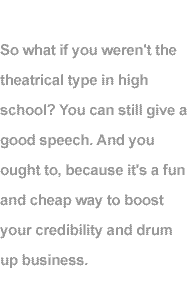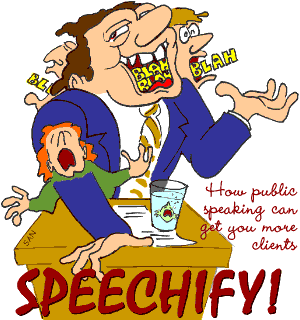|
 A speech is a great method for establishing credibility.
A speech is a great method for establishing credibility.

|
|
Speechifying = Stealth Advertising
Public speaking has certain inherent advantages as a marketing tool. New prospects may be considering your services, but be hesitant to trust someone they don't know. This is especially true if they haven't gotten a personal referral to you -- and your printed marketing materials may not fill this credibility gap because people tend to discount things that are obviously ads. (A speech, because it's identified more with education than with advertising, is a wonderful method for establishing credibility.) They get to audition you, to try before they buy, to see if you're the type of person they'd like to work with. Not only that, but people often go to speeches as a form of entertainment, which means they're in a receptive mood. If you're a good speaker, your room full of qualified prospects will be predisposed in your favor and give you their undivided attention. As a marketing tool, public speaking is also better than making cold calls or sending out direct mail because it's more personal.
Paul, a psychotherapist, almost always finds clients in the audiences he addresses. Every three months or so, he goes into a local software company to talk to the employees during lunch. (His most popular topic is "Getting Along with Difficult People.") At the end of the talk he mingles, passing out business cards and taking questions. Then he runs back to his office to answer the ringing phone.
Let Them Do the Work
Once you've decided to give this a try, your next step is to identify venues that will pack the hall with prospective clients and referral sources. Three of the most common venues are professional associations, companies, and educational institutions.
To get a speaking gig at a professional association, you should contact the executive director, introduce yourself, and say that you'd like to speak before the membership. Associations often need speakers, and most will consider your offer if you're able to speak on a subject compelling to its members. Don't mention compensation in your initial conversation -- some associations will pay you and some won't. You don't want to volunteer to speak for free when there's a chance the group might pay you. By keeping mum for a while, you're hoping the executive director may clue you in without prompting: either by asking how much you charge, or by explaining forthrightly that, as a rule, the association doesn't pay for speakers.
Companies work a little differently from professional associations: often they'll approach you as a possible speaker, rather than the other way around. If you've been pitching your consulting services to them, this may be one stage in their evaluation of you as a potential contractor. Whether or not that's the case, whenever you make a presentation to a company that's also a potential client, you want to project your expertise but also imply more than you say. That is, don't reveal everything you know about the subject on which you're speaking (otherwise known as "data dumping," a phenomenon we'll discuss in a moment). If, at the end of your speech, your corporate audience feels that it's milked you for all you're worth, you're unlikely to get any work out of them, which is the whole point of using public speaking as a marketing tool.
Finally, you might volunteer speaking before college or university groups, which pursue speakers more often than they are pursued by them, but which, given their educational mission, will also consider solicitations from people who have something valuable to say.
The beauty of educational institutions is that they'll do the grunt work for you, namely the advertising. They'll write, print, and distribute catalogs and fliers throughout their community, relieving you of a major time-commitment and financial expense. (On the other hand, you're trusting them to do a good job; ask to review their description of you and your lecture or seminar before it goes to press.)
Moreover, colleges will typically provide a classroom or lecture hall, perhaps even with audio-visual equipment for recording your performance. Sometimes they'll even assist with the cost of producing handouts. Many program coordinators can advise you about effective titles and marketing copy, and they'll do most of this well in advance of your speech, allowing time for news of it to filter into the community and reach the people whom you would want to show up.
Some academic institutions and college groups pay a speaker's fee (sometimes referred to as an "honorarium") and some don't; the amounts may differ drastically from school to school, group to group.
|
|
 Prepare and practice, but don't read the speech and don't data dump.
Prepare and practice, but don't read the speech and don't data dump.

|
|
Rules for Speaking
Once you've booked your presentation it's time to start creating it. Which brings us to...
First rule: Prepare, prepare, prepare. Many speakers assume that, if they know their subject well, speaking about it before an audience is similar to chatting about it with a friend. Wrong. You'll end up with a disorganized ramble that will turn off the audience. You have to show respect for their time by having a carefully thought out, structured, logical outline. And then you have to practice giving the speech -- out loud -- in front of a friend, or a mirror, or even your dog. A good rule of thumb is to spend three to four hours preparing for every hour you expect to speak. Remember: deep knowledge of your subject area is no substitute for preparation.
Second rule: Don't read your speech to the audience. Does this sound like a contradiction to the previous rule? It's not. Glancing at an outline from time to time shows preparation, organization, and respect for the audience; reading from a script is amateurish. If you've prepared properly, referring to the outline every few minutes will refresh your memory and keep you on track; the exact words you use should be spontaneous.
Third rule: Don't "data dump." You may know a lot about your subject and be tempted to share everything you know. This may come from a desire to impress people with your expertise, but whatever the reason, presenting too much material will put your audience to sleep. Those who remain awake will daydream; those who stay for the entire lecture will bolt the moment you're done and forget your name before they're out the door. Condense your information and leave your audience thirsty for more.
Fourth rule: Leave time for questions, but not so much time that it will be awkward if there are few or none.
Probably the most important thing that you can do during your talk is to just be you. Be real. If you're proud of what you've been able to do for some for your clients, talk about that. Don't feel you need to imitate anyone else and don't think you have to be perfect. By being real, by showing people what you're passionate about, your audience will connect with you.
Give these ideas a try. In no time you'll find that giving speeches and seminars is not only an effective marketing tool, but that it's invigorating as well. You'll discover that public speaking is a terrific way for your prospective clients to find out just how good you are.
|



